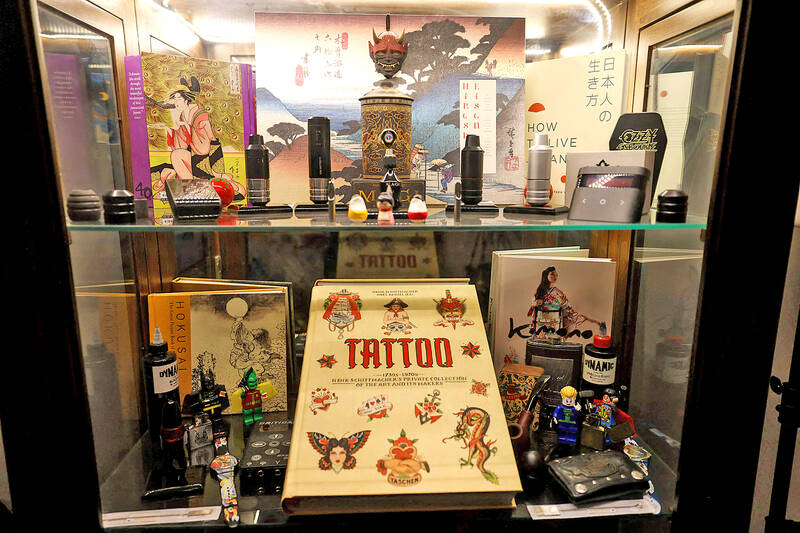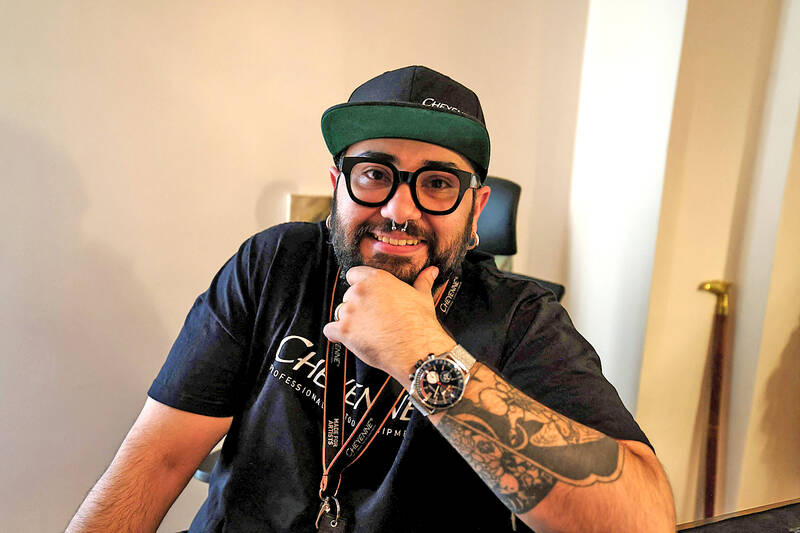Within a flat in northern Tehran, concealed from the public eye, Sean proudly showcases the tattoo motifs crafted by his students, each meticulously etched onto silicon canvases.
The 34-year-old opened the studio only eight months ago, aspiring to share the art of tattooing that over the years has largely thrived underground in the Islamic republic.
“All tattoo artists in Iran usually work at home,” Sean, using his artistic nickname, said in his studio.

Photo: AFP
“We risked a lot this year by opening this place and turning it into an academy.”
While Iran has not explicitly banned tattooing, conservatives still view the practice as linked with immorality, delinquency and Westernization.
Yet tattoos have gained popularity in recent years in the country, with many young people proudly displaying their ink in public.

Photo: AFP
Seeing the growing trend, Sean opened other studios in the southeastern city of Kerman and the resort island of Kish.
Now, he has more than 30 students eager to learn the craft, which he describes as a “bottomless art.”
“All sorts of people now are doing tattoos,” said Sean, who has been a tattoo artist for 17 years.
In the past, he said, “people wanted something small, simple, that no one can see.”
“But now they’re saying ‘Ink me up.’”
‘SATANIC AND OBSCENE SYMBOLS’
In recent years, some Shiite scholars in Iran have declared that tattoos are not forbidden under Islamic law.
“Tattooing is not forbidden, provided that it does not promote non-Islamic culture,” according to the website of Iran’s supreme leader, Ayatollah Ali Khamenei.
Despite the growing acceptance, there are still some in Iran who frown upon the practice.
In September last year, Iran’s volleyball federation said players must cover any tattoos or risk being barred from taking part in the 2022-2023 season.
Several prominent football players faced summons to Iran’s sports morality committee in recent years for displaying their tattoos.
In 2019, a Tehran police official said having “visible and unconventional tattoos” may require individuals to undergo a “psychological examination” before obtaining a driver’s license.
Others faced arrest, including in 2016, when authorities rounded up a “tattoo gang” for allegedly tattooing “satanic and obscene symbols” on people, as reported by the Tasnim news agency.
Benyamin, a 27-year-old cafe owner, says some people often perceive him as a criminal because of the tattoos covering his torso and back.
“Tattoos are not a crime on their own, but you will be stigmatized as a thug, should something happen,” like being arrested, he added.
Sean says he is aware of the conservative societal and cultural perceptions in Iran, aspects he has conscientiously addressed within his studios.
“Women do tattoos for women, men do tattoos for men,” he said.
‘WOMEN, LIFE, FREEDOM’
In Iran, women with tattoos face more intense scrutiny than their male counterparts, compelled to adhere to a stringent dress code that mandates covering their heads and necks.
Some even see it as an act of defiance.
In Tehran, numerous tattoo studios showcased designs featuring the slogan “Woman, life, freedom” — a rallying cry during nationwide protests sparked by the death in custody last year of Mahsa Amini.
A 22-year-old Iranian Kurd, Amini had been arrested in September 2022 for allegedly violating the Islamic republic’s strict dress code for women. Others only see it as a form of self-expression.
“I like tattoos a lot and I wanted to express my thoughts that way,” says Sahar, a 26-year-old nurse who has a tattoo on her arm reading “do not be afraid of anything” in Arabic.
But she acknowledges that having tattoos “is likely (to cause problems), especially if you want to work in the public sector”.
Undeterred by the challenges, Kuro, a 24-year-old student at the studio, remains steadfast in her determination to practice her craft.
“Now people are generally more supportive,” she said after touching up a Koi fish design etched on a silicon sheet.
She hopes that “as a woman tattoo artist, I will be able to work without restrictions.”

Last month historian Stephen Wertheim of the Carnegie Endowment for International Peace published an opinion piece in the New York Times with suggestions for an “America First” foreign policy for Democratic presidential candidate Kamala Harris. Of course China and Taiwan received a mention. “Under presidents Trump and Biden,” Wertheim contends, “the world’s top two powers have descended into open rivalry, with tensions over Taiwan coming to the fore.” After complaining that Washington is militarizing the Taiwan issue, he argues that “In truth, Beijing has long proved willing to tolerate the island’s self-rule so long as Taiwan does not declare independence

Big changes are afoot in global politics, which that are having a big impact on the global order, look set to continue and have the potential to completely reshape it. In my previous column we examined the three macro megatrends impacting the entire planet: Technology, demographics and climate. Below are international trends that are social, political, geopolitical and economic. While there will be some impact on Taiwan from all four, it is likely the first two will be minor, but the second two will likely change the course of Taiwan’s history. The re-election of Donald Trump as president of the US

Nov. 25 to Dec. 1 The Dutch had a choice: join the indigenous Siraya of Sinkan Village (in today’s Tainan) on a headhunting mission or risk losing them as believers. Missionaries George Candidus and Robert Junius relayed their request to the Dutch governor, emphasizing that if they aided the Sinkan, the news would spread and more local inhabitants would be willing to embrace Christianity. Led by Nicolaes Couckebacker, chief factor of the trading post in Formosa, the party set out in December 1630 south toward the Makatao village of Tampsui (by today’s Gaoping River in Pingtung County), whose warriors had taken the

Gunshots, screams, eerie laughter: South Korea’s border island Ganghwa is being bombarded nightly with blood-curdling sounds, part of a new campaign by the nuclear-armed North that is driving residents to despair. Before it started, 56-year-old Kim Yun-suk fell asleep to the hum of insects and woke to the chirping of birds. Now, she is kept awake every night by what sounds like the soundtrack of a low-budget horror movie at top volume. “The peaceful sounds of nature... have now been drowned out,” Kim said. “All we hear is this noise.” The campaign is the latest manifestation of steadily declining ties between the two Koreas